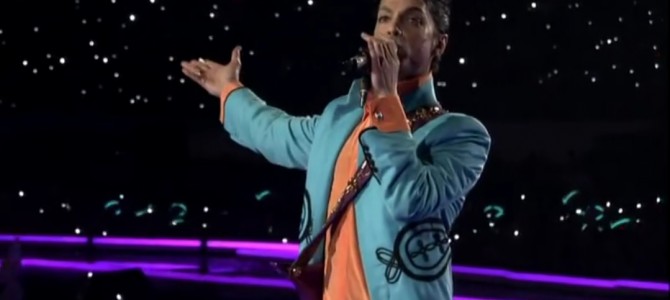
In 2004, I went to see Prince at Conseco Fieldhouse in Indianapolis during his “Musicology” tour. His set was somewhere around a 60/30/10 split of the hits, deep cuts, and material from his new album, featuring an early, riotous performance of “Let’s Go Crazy,” a haunting acoustic version of “Little Red Corvette” mid-show, and a soaring, 20-minute encore of “Purple Rain” featuring a guitar solo that tore the feels out of your heart with thick, screaming notes forged from electrified steel vibrations and pure catharsis, notes that made you wonder why, if sounds like this were possible, people wasted their time listening to anything else.
I’m nowhere near a concert junkie, but I’ve seen my fair share of high-profile artists on stage, many of whom are known for the quality of their live shows. If I were to rank the best live acts I’ve ever seen, there’s Prince in first place and there’s “it doesn’t matter because no one else is even close to Prince” in second.
If I remember correctly, I paid around 70 bucks for my ticket to that show, but if I’d paid over a thousand, and all Prince had performed was that encore of “Purple Rain,” I wouldn’t have felt an ounce of buyer’s remorse.
Falling in Love with Prince
Although I was always aware of Prince’s music growing up, I didn’t really become a fan until I bought an $8 copy of “Purple Rain” at a used CD store when I was in high school in the late ’90s. Growing up as the son of a conservative Lutheran pastor in a conservative Indiana town surrounded by relatively conservative Hoosier friends, I never found anyone who was terribly eager to devour both discs of “Sign O’ the Times” with me on a road trip or to accept my “try to hit all the high notes in ‘Kiss’ without developing vocal nodules” challenge. Likewise, years later, when I decided to become a conservative Lutheran pastor myself, I didn’t find many more Prince aficionados at the seminary or in my congregations.
This is, of course, something I understand. Prince’s penchant for pumping his music full of funk and jazz influences wasn’t terribly appealing to many red-state rockers who were raised on a diet of Mellencamp and didn’t know exactly what to do with a sequin-clad pretty boy who spent half his albums falsetto-wailing an octave and a third above middle C. For attentive, Christian parents like my mother, who mostly become aware of Prince during Tipper Gore’s PMRC hearings, it made sense they didn’t want to give a fair shake to Prince’s indisputably brilliant “The Beautiful Ones” when the indefensibly filthy “Darling Nikki” was lurking just two tracks away.
But, for whatever reason, I hurdled the roadblocks that prevented so many who shared my background from embracing him. If there’s anything I wish to impart to those who didn’t join me in the purple fan club, it’s this: Even if you can’t stand the genres Prince performed, and even if you were understandably put off by his outlandish and often times obscene persona, it is an indisputable truth that Prince’s level of talent was not of this world.
Undeniable Musical Supremacy
For whatever reason, when God knit Prince Rogers Nelson together in his mother’s womb, he saw fit to give Prince more musical talent than virtually every other human being on the planet, bestowing on him the third-largest vocal range in pop music history, the ability to play countless instruments fluently, and a deadly command of the hook. In fact, Prince was such a prolific songwriter that he had a literal vault filled with unreleased material. (Before any haters assume all of these tracks must have not been worth releasing, remember that Prince essentially threw away arguably his greatest song before Sinead O’Conner rescued it from the waste bin and gave us one of the best female vocals of the 1990s.)
Likewise, most artists would never have been able to upstage either James Brown or Michael Jackson at any point in their careers. Prince managed to best the both of them on the same night. For anyone still unable to see past aforementioned sequins and soprano screaming, close your eyes and listen to Prince casually rip off one of the best guitar solos you’ll ever hear. Eric Clapton is widely considered to be among the greatest axmen ever, and his solo on the original recording of “While My Guitar Gently Weeps” is likewise considered one of his greatest feats, which means Prince’s solo at the 2004 Rock and Roll Hall of Fame ceremony is the musical equivalent of Rocky Balboa winning the heavyweight title by ripping Apollo Creed’s arms off and punching him to death with his own fists.
However, Prince didn’t always use his God-given talent to the glory of the one who gave it, as his countless songs glorifying lust and promiscuity made abundantly clear. Throughout most of his career, Prince had a regular habit of taking the brilliance his creator gave him and pumping it into throwaway, pornographic songs that, for late-to-the-Prince-party Christian fans like me, was about as disappointing as if poetry lovers discovered that, in between scribing some of the greatest poems in American history, Robert Frost wrote a thousand dirty limericks for Hustler magazine.
Despite Prince’s Glorification of Lust
Despite reveling in the sexually explicit material so common in pop and rock music from the late seventies through the nineties, Prince also wrote more explicitly Christian lyrics than any mainstream musician of that era not named Bono, composing numerous tracks that praised the God who made him and that confessed the atonement of Jesus Christ, even if they confessed it in ways that wouldn’t exactly have passed doctrinal review in most orthodox Christian churches.
Likewise, while many rock stars of his era were notorious for their illicit exploits with female fans, one old Prince urban legend says that he would occasionally gather groupies together, sit them down on the floor, and read the Bible to them until they got fed up and left. I don’t have any proof of this, but considering Prince’s lifelong habit of challenging people’s preconceived notions of him, it’s not hard to imagine him, with a smirk, reading through 1 Corinthians while a handful of scantily clad women stormed out of his dressing room, irritated that their plan to hook up with a rock star had ended with an unexpected encounter with Jesus.
For Christians who prayed God would let them stop loving the sins Prince would frequently celebrate in his music, it was often frustrating to see Prince thank God for inspiring him to write music that helped inspire the “parental advisory: explicit lyrics” sticker. But the diminutive genius from Minnesota always left us with enough hope that he’d one day put his lust behind him and quit diverting his God-given talent away from nobler subject matter.
Those hopes were realized in 2001 when Prince finally jettisoned the dirtier elements of his repertoire from live shows after becoming a Jehovah’s Witness, but for orthodox Christians, it was a rather pyrrhic victory. We were certainly glad to see Prince finally embracing Ephesians 5:3-5, but hated to see it happen at the cost of him rejecting everything the Bible taught about the Trinity, the nature of Christ, and the salvation that comes to us by grace alone.
The angels in heaven certainly rejoice when a sinner turns away from his lust because he believes that Christ has freed him from that transgression. The angels weep, however, when a sinner stops committing the same sin because he’s submitting again to the yoke of slavery, thinking that he needs to open heaven with his own works because he believes that the blood Christ shed at Calvary was insufficient to win his salvation.
Prince’s Confessions
Speaking of the crucifixion, I don’t know if Prince stopped performing it post-conversion, but the song from “Sign o’ the Times” that was most at odds with Prince’s newfound confession of faith wasn’t actually “If I Was Your Girlfriend” but the Good Friday-centered track “The Cross.” As you may have learned if you’ve ever talked with any Jehovah’s Witnesses who have knocked on your door, they are quite insistent that Jesus didn’t die on a cross, but on a “torture stake.” Likewise, Prince’s 1987 confession that eternal life comes through faith in Christ alone was certainly at odds with the Watchtower’s “Jesus started it, you finish it” doctrine of salvation.
But if Prince was considering his countless compositions in his final moments, that’s the song I hope was dearest to his heart. In his last days, I hope Prince retained his rejection of his indecent compositions but returned to the God he confessed in his less outwardly righteous days and trusted that that everything his Father required of him was credited to him through faith in the bleeding hands of Jesus.
As I mourn the death of one of the twentieth century’s greatest talents, I hope he remembered the love of the triune God proclaimed to him in the Scriptures—love manifested for all the sinners of this world, even those who wrote “Darling Nikki,” when the Father’s only begotten Son died for their sins and rose again for their justification. As Prince Rogers Nelson drew his final breath, I hope he took the advice he gave the world nearly 30 years ago when he contemplated the final breath of Jesus Christ and sang, “black day, stormy night / no love, no hope in sight / don’t cry, he is coming / don’t die without knowing the cross.”









